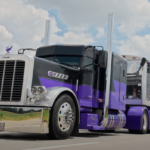The U.S. Senate has given its approval to a bill designed to simplify the process for military veterans to acquire a commercial driver’s license.
The “Veteran Improvement Commercial Driver License Act of 2023” has been advanced from the Committee on Veterans Affairs and received unanimous consent in the full Senate on Thursday.
This legislation, supported by the American Trucking Associations and the Commercial Vehicle Training Association, eliminates the current requirement of a two-year waiting period for certain CDL schools that veterans may wish to attend and fund using their GI Bill benefits.
As per the existing law, the U.S. Department of Veterans Affairs is prohibited from endorsing CDL courses offered at satellite branches of educational institutions if the branch hasn’t been operating for at least two years.
The new legislation removes this restriction, enabling the VA to endorse a CDL program for veterans at a newly established branch, provided it is appropriately licensed by the state and follows the same curriculum as the program at the main institution that has previously gained approval.
However, similar legislation in the U.S. House of Representatives is facing closer scrutiny.
During a House veterans affairs subcommittee hearing that took place on Thursday, Joseph Westcott, who serves as the legislative director for the National Association of State Approving Agencies, expressed concern about the current state of the legislation, which is identical to the Senate version. Westcott cautioned that this legislation effectively eliminates protections for veterans that the two-year waiting period offers.
He explained that the waiting period serves the purpose of preventing veterans from enrolling in subpar and short-lived truck driving schools. It does so by giving branch schools sufficient time to prove their stability and the quality of their curriculum.
“This bill, as presently drafted, only requires that an institution offer the same curriculum as a previously state-approved institution anywhere in the nation,” Westcott said. “A truck driving school could request immediate approval of a ‘branch’ campus anywhere in the nation, and the [state approval agency] of jurisdiction would have no records (graduation rate, CDL pass rate, or job placement) to determine the approvability of the program.
“If we don’t safeguard that, then we would be in the situation where somebody could get approval in the state of Idaho, and now the two-year rule is effectively swept away in North Carolina. That’s concerning to me.”
However, the subcommittee Chairman, Derrick Van Orden, a Republican from Wisconsin, expressed his worries during the hearing. He was concerned that the opposition from state approval agencies regarding the wording of the bill might pose a significant obstacle to its approval, particularly if it results in the disapproval of CDL branch schools located in a different state but in close proximity to the primary school.
However, “we’re going to work with you on this,” he told Westcott. “Truck driving is a fantastic job, and if we can get our guys and gals behind the wheel and actively employed it would be fantastic.”





